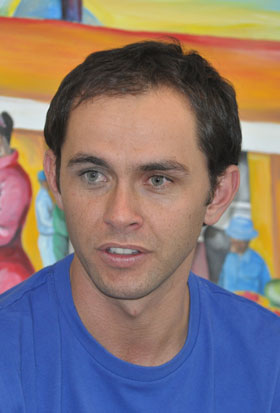
South Africa is too small a market to accommodate four mobile operators, Cell C CEO Alan Knott-Craig told journalists on Wednesday.
Replying at a media conference to a question from TechCentral, Knott-Craig said: “I think it’s too late for four. Maybe [it made sense] five or seven years ago [but] after 20 years we have 120% penetration. I don’t think there’s enough space.”
However, he wouldn’t be drawn on potential discussions with newly appointed Telkom CEO Sipho Maseko about how to bring about consolidation in the sector.
Telkom Mobile recently slashed mobile rates, introducing prepaid tariffs as low as 29c/minute on per-second billing for on-network calls in areas it has its own coverage. Calls to other networks on its new Sim-Sonke plan are priced at 75c/minute.
“The most important thing is that the challenger networks are trying to do their job of bringing the prices to the market down,” Knott-Craig said. “Telkom Mobile is doing exactly the right thing. They are attacking Vodacom and MTN in pricing. That’s what challengers are supposed to do, primarily through price.”
Knott-Craig used the media conference to reemphasise his belief that the Independent Communications Authority of South Africa (Icasa) needs to do more to protect these challenger operators — he includes Cell C in the category — to allow them to compete more effectively with Vodacom and MTN.
Cell C is South Africa’s third largest mobile operator, with 11,5m active customers. It has grown its subscriber base by 2,5m over the past 18 months due to aggressive pricing and marketing.
The decision by Cell C’s majority shareholder, Oger Telecom, to provide R3,5bn in new equity funding appears predicated on the mobile operator receiving support from Icasa, including asymmetry in termination rates under which Cell C would pay less to MTN and Vodacom to carry calls onto the bigger operators’ networks than the other way around.
Asked by TechCentral whether Cell C had a plan B if Icasa did not provide asymmetry and other supportive regulatory measures, Knott-Craig said: “We have a plan B and a plan C. But I think plan A will work.”
He said that South Africa was not attracting international investment in its telecommunications industry. Not supporting smaller industry players to take on the big incumbents would not solve that problem. “We are not investor friendly. Money is flowing out of the country in the form of dividends,” he said. “As a country we should be attracting foreign investment into this sector and we’re not.”
He added that, in his view, any operator with less than 25% market share should enjoy asymmetry in termination rates from Icasa. Asymmetry in Europe had helped to make telecoms markets there highly competitive, he said. “As soon as the smaller guys get to 25%, everyone is on an equal footing again.”
South Africa would do well, Knott-Craig said, to replicate the quality of its regulation of financial services in the telecoms sector. He called on government to provide proper funding to Icasa. “You can only do your job if you have the resources to do it.” — (c) 2013 NewsCentral Media




